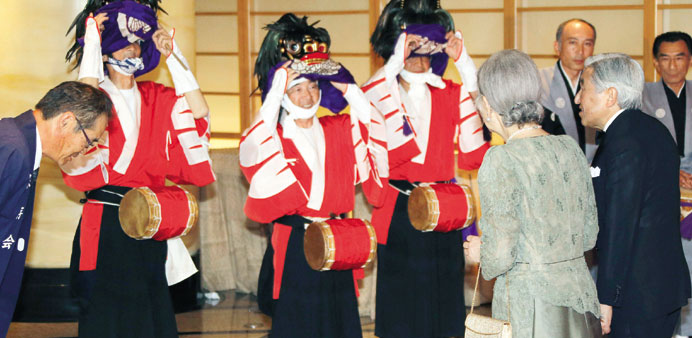Japanese Emperor Akihito and Empress Michiko speak to Aizu (lion dancers) at a Yokohama hotel for the 2013 Hideyo Noguchi Africa Prize awards ceremony on the sidelines of the five-yearly Tokyo International Conference on African Development in Yokohama.
AFP/Tokyo
Japan said yesterday it would give $14bn in aid to Africa over five years, as Tokyo scrambles to grab resources and market share at a time of increased interest in the region from China.
Around half of the money will be targeted at infrastructure development, with Japan seeking to match its firms’ desire to export transport systems and power grids with the gaping needs of the continent.
Japan’s overseas development aid (ODA) “will be about 1.4tn yen ($14bn)” Prime Minister Shinzo Abe told a three-day conference in Tokyo involving the leaders of more than 40 African countries.
Including this aid, “Japan will offer up to 3.2tn yen in support to Africa’s growth via public and private sector investment”, he said.
Despite relatively long-standing connections, Japan’s importance to Africa has slipped behind that of China, whose more aggressive approach has given it five times the trading volume and eight times the direct investment.
China does not give official amounts for its ODA, but reports suggest it gives up to $2bn annually. The figure Japan announced yesterday outstrips that significantly.
The five-yearly Tokyo International Conference on African Development (TICAD), a get-together of political leaders from across Africa, is Japan’s two-decade-old effort to boost links.
Tokyo’s commitment to Africa differed from that of other nations, Abe said, in remarks that appeared to have been a reference to China.
Beijing is criticised in some corners for what is sometimes seen as prosecuting little more than a resources grab and for not linking investment with demands for improved human rights or more transparent governance in recipient countries.
“Africa’s abundant natural resources provide important business opportunities for the resource-poor Japan. But Japan would not explore and dig resources simply to bring them to Japan,” Abe said.
“We will support Africa so that African natural resources will lead to African economic growth.
“Africa’s rapidly growing market is not less attractive than its natural resources to Japanese companies.”
Abe called for the introduction of transparent rules on business and efforts to boost security for Japanese living and working there.
The focus on private-sector investment was welcomed by delegates, with South African President Jacob Zuma saying the continent’s economy had to develop.
“Africa must move from a path driven by commodities export to one led by industrialisation and diversification,” he said. “Three points are crucial (in the path to development): market integration, industrial development and infrastructure development.”
The broad agreement on the need for better transport connections will be music to Abe’s ears after his ambitious pledge last month to treble exports of infrastructure to 30tn yen a year by 2020 as part of his plan to reanimate Japan’s lifeless economy.
At the same time, Japan’s firms see Africa as an opportunity for expansion at a time that their home market is contracting and stultifying because of a population that is rapidly ageing and is forecast to shrink.
Those hopes were also given a boost in the form of plans to expose Africans to Japanese companies through education and training.
Over the next five years, Abe said, Japan will invite 1,000 students to study in universities and gain experience as interns at Japanese companies, and Tokyo will work to find jobs for 30,000 people in Africa.
“Japan will also construct hubs for human resource development at 10 locations in the field in Africa, including in Ethiopia and Senegal. We will send experts in vocational training to these hubs,” Abe said.
Makoto Katsumata, professor of African studies at Meiji Gakuin University, said Tokyo was right not to ape Beijing.
“What Japan should do is not just emulate China’s aggressive pursuit of natural resources, but something that builds on trust Japan has nurtured with African nations over the past years,” he told AFP.

